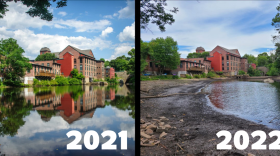Under normal circumstances, the Mohawk Trail State Forest in Charlemont, Massachusetts, offers campsites as well as cabins. But last summer, the park was closed to overnight guests, because of necessary upgrades.
The state had hoped to reopen by November but missed that target.
A couple of folks from the Department of Conservation and Recreation join us to tell us more.
Kate Preissler, regional director, DCR: We're in the home stretch. So, unfortunately last spring we did encounter a well issue. We weren't going to be able to have clean water for the campground and we were going to have to close.
We shifted gears pretty quickly. It's been a very busy summer for park operations despite the closure, but the work was of a totally different nature than when the campground is open.
What were some of the specifics about the water quality that necessitated these upgrades?
Raul Silva, deputy chief engineer, DCR: It was just a simple lack of acceptable water quality, and it was due to a couple of factors.
One is the age of the well. It was somewhere in excess of 50 years old. But a couple significant weather events impacted the well. One was the drought 18 months ago, and then couple that with a couple of significant storm events, rain events, flood events last summer. That was part A.
And part B was the water line — the distribution of that water throughout the park.
Well, I imagine the location right alongside — tucked in beside the river, and with that beautiful and dramatic mountainous terrain, that is not easy to just relocate a well and water lines. Human-caused climate change is going nowhere. How do you predict what's going to be appropriate when you rebuild the system?
Silva: Yeah. Great question. So, today's well standard, it is much more compact, much more sustainable. And it's deeper. So we are hopeful that the additional depth minimizes those groundwater or climate issues. So, I would describe it, Carrie, as "groundwater with a capital G." The old well was about 30 feet. This well is more than 80 feet deep.
And then, secondly, the old water line went through the woods, because that's how people built water lines in the '30s, '40s and '50s. They went from point A to point B. Our new water line is under the campground road system. It's in an area where we can monitor. We've got some periodic manholes along the way.
The new standards, we believe, will allow us sustainable, reliable water supply. Obviously, there are climate change issues that we're all aware of. Ad I think we at DCR are trying to do as much planning, both in infrastructure and recreation, as we can. But we think between those two items will allow us safe, clean water for the next 30 or 40 years.
From your perspective, what is the status of the renovation?
Silva: Renovation is at its final steps. We have finished, frankly, all the physical work. We're waiting for final regulatory approvals. A new well takes some steps with our sister agency, the Department of Environmental Protection. So, we've taken our final water tests. We've sent them over to our DEP. Once they approve it, we are fully operational and we plan to be open later this year, or early in the new year.
We took the time that the park was closed for doing the infrastructure work, doing a lot of recreational improvements. So, improvements to the cabin rentals and roofs and screen doors. So we did take advantage of this downtime.
I know I saw on a number of social camping forums comments of disappointment from former campers and potential campers. Did you hear similar sentiments at DCR?
Preissler: Yeah, of course it was disappointing. I think, you know, I can speak for my staff. It was as devastating for them as anyone else. That's their passion and their love is to run that campground and to welcome visitors. We did the best we could in a bad situation. And so, we invested in our interpretive program there. Folks might have seen a lot more guided hikes, new interpretational programs. We cleaned out and spruced up some nature centers so that we could increase day-use to the site.
So even if you couldn't camp there, you could return to Mohawk Forest, have a great experience with our staff, learn a little bit about the old-growth forest there or other features. We tried to provide that opportunity and then of course, we did our best to accommodate anyone looking for camping at one of our other campgrounds.
Do you expect the increase in interpretive programs to continue once renovations are complete and the campers return?
Preissler: Yes, absolutely. That was a programmatic investment that we made that we hope to sustain and grow throughout the coming seasons.
While the date for reopening Mohawk Trail State Forest remains unknown, how will folks know when they can make reservations when it reopens?
Preissler: We're just waiting, as Raul said, for that DEP approval. And once we know in hand and we're absolutely sure that everything is a go, there'll be a good 10 day to two-week period where we'll be promoting reservations and people will have the opportunity to go on Reserve America, sign up for cabins as usual, and will be off and running for the rest of the season, operating as we normally do.





